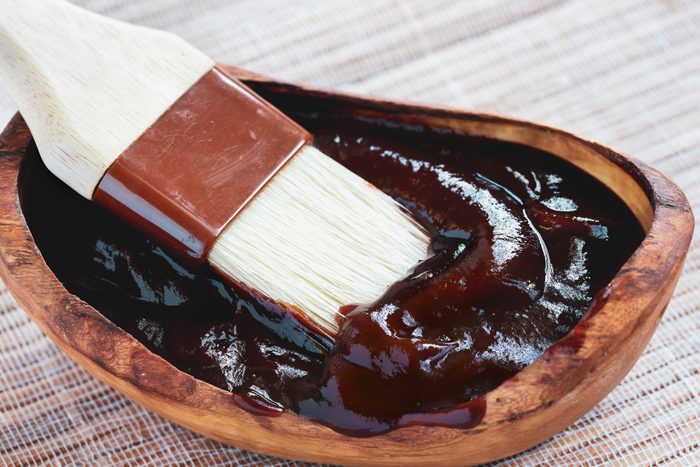
It’s 3 p.m. and you’ve hit a wall. You’re fatigued, sluggish, unfocused. Research in 2009 published in the journal Sleep suggested a mid-afternoon slump is a normal part of our circadian rhythm, or the body’s internal sleep clock.
But more recent clinical wisdom suggests that this isn’t necessarily always the case. If a major dip in energy is a regular hurdle in your daily routine, diabetes specialists say it’s possible that a crash in your blood sugar could be to blame.
Here’s How Long the Best Nap Lasts, a Neuroscientist Says
What causes blood sugar to crash?
A brief dietetics lesson: carbohydrates are a source of fuel for our body. They’re easy to break down into glucose, the “simple” sugar, which makes for a potent punch of energy for our cells, tissues, and organs.
While our body transforms the carbs we eat into glucose, the pancreas releases insulin. This hormone directs this glucose into cells to keep the amount of sugar in our blood stable. Whenever we eat more sugary carbs than usual, our body simply releases extra insulin to manage this excess.
People with diabetes have difficulty keeping blood sugar levels stable because of their body’s inability to properly respond to this insulin—so they’re prone to blood sugar swings without proper management. But if you don’t have diabetes, the excess insulin works to clear extra sugar from your blood quickly.
As sugar levels return to normal, it can leave you feeling foggy and fatigued. Over time, blood sugar spikes and dips can lead to insulin resistance, a precursor to diabetes. And if you’re experiencing highs and lows on a regular basis, this can lead to prediabetes.
That’s why it’s important to try and maintain nice, stable blood sugar. Limiting candies, cakes, and other foods with added sugars is a good start, but diabetes nutrition experts provide education to readers of The Healthy @Reader’s Digest on the less-than-obvious foods that can cause blood sugar spikes.
Trying to Quit Sugar? A Diabetes Patient Reveals the One Change That Saved His Life
Foods you might not expect to spike your blood sugar
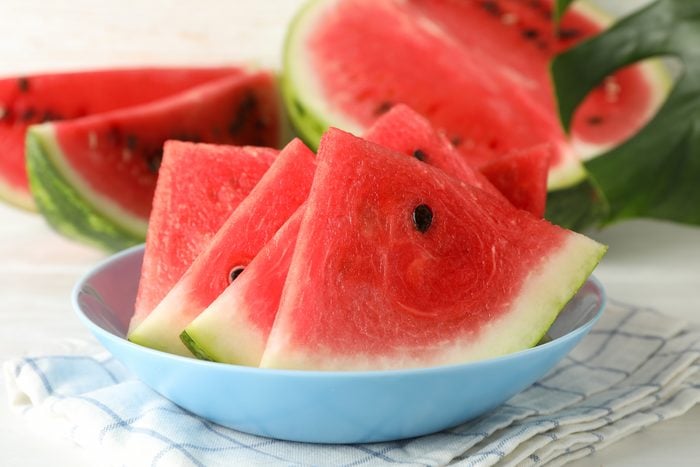
Watermelon
Just about all fruits are naturally sweet. However, says Natalie Allen, RD, clinical assistant professor of biomedical sciences at Missouri State University, watermelon can have a stronger effect on your blood sugar because it contains less fiber and protein than fruits like berries and apples.
That doesn’t mean you have to avoid it altogether, but consider adding a protein or fat—like feta cheese—to your watermelon slice to help your body slow down the absorption of this melon’s sugar content.
Get The Healthy @Reader’s Digest newsletter every morning
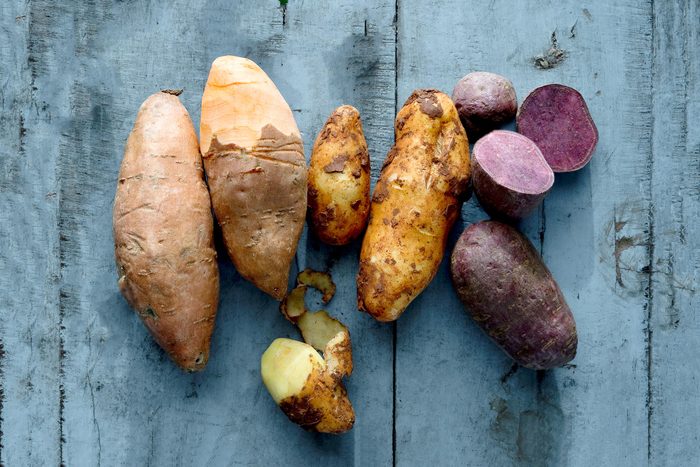
Potatoes
A cup of potatoes raises your blood sugar as much as a can of soda does, according to the Harvard T.H. Chan School of Public Health. That said, the nutritional value of potatoes is plentiful, as this beloved root veg contains goodies like vitamin C and potassium.
Allen tells us it’s all about moderation and balance. She recommends including a source of healthy protein or mixing in fiber-rich vegetables like broccoli and bell peppers with a small potato. These additions help your body digest the potato’s sugar content.
Nutrition Pros Just Revealed What 12 Common Food Cravings Secretly Suggest about Your Health
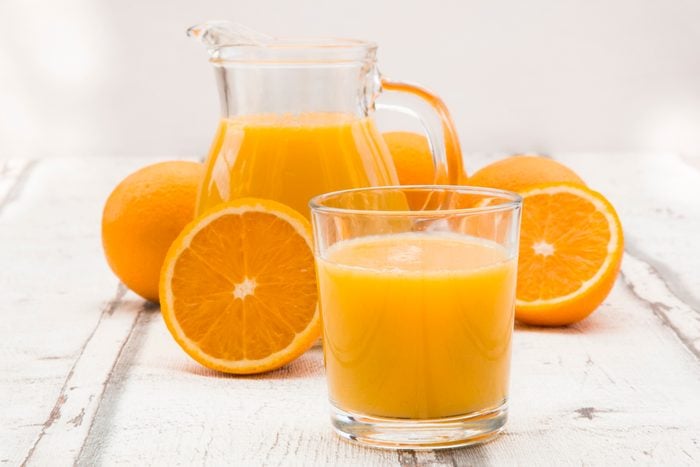
100% juice
Fiber can deliver huge benefit when it comes to diabetes management or prevention. Unfortunately, the problem with many fruit, vegetable, and “detox” juice cleanses is that even though they can be an efficient way to get more vitamins and minerals, the process strips the food of this dietary fiber.
Certified diabetes care and education specialist Ruth Pupo García, RDN, CDE, explains that this means the fructose—the natural sugar in fruits and vegetables—has nothing to stop it from rapidly flushing your bloodstream with sugar.
Craving Sugar? A Dietitian Says You May Need More of This Surprising Nutrient
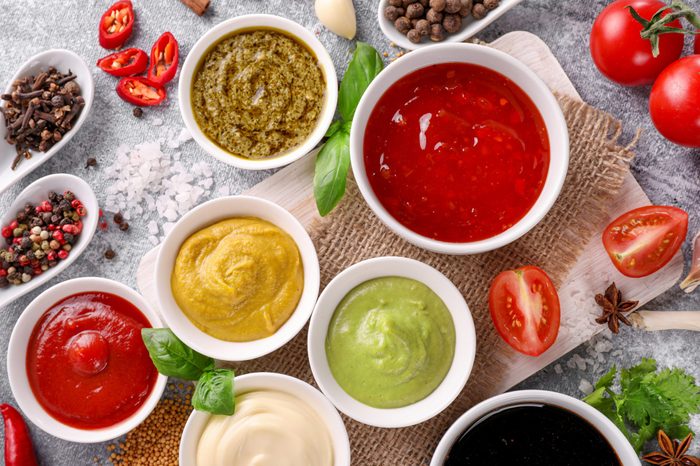
Sauces and condiments
Really? Yes! “The condiments and dressings you use can add up to be big sugar bombs in your meals,” explains Kelsey Lorencz, RDN.
Lorencz says sauces like ketchup, barbecue sauce, and salad dressings can have as much sugar as a cookie or ice cream. Her advice? Carefully stick to the suggested serving sizes on the label to keep these sneaky sugar loads from adding up too quickly.
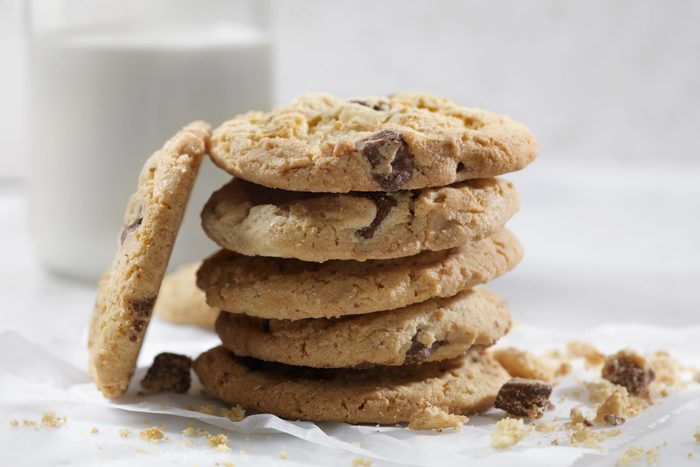
Sugar-free products
Dana Ellis Hunnes, PhD, MPH, RD, a senior dietitian at UCLA Medical Center and author of Recipe For Survival, tells The Healthy: “There are a lot of ‘sugar-free’ cookies and pastries on the market that are advertised and directed toward people with diabetes.” Hunnes adds, “While they may not have added sugars, they still have carbohydrates from the grains and other products used to produce them—and so are not really a ‘diabetic-friendly’ food.”
Follow The Healthy @Reader’s Digest on Facebook, Instagram, and Twitter
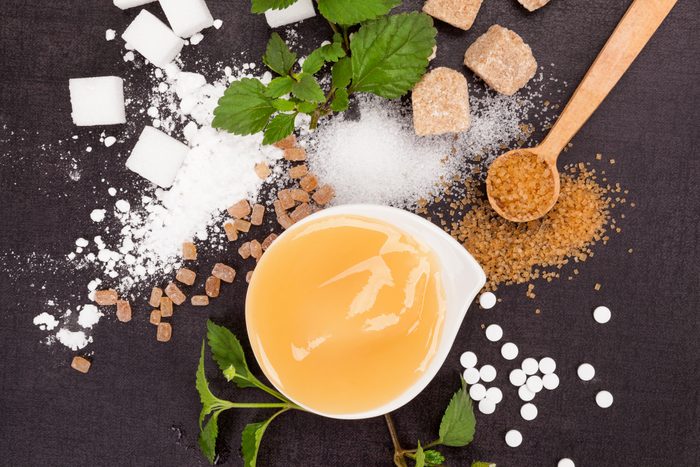
Artificial sweetener
Recent research tallies another vote against “sugar-free” products for blood sugar management. Whether included in sugar-free snacks and sodas or added to your coffee, a 2020 study published in the Journal of Family Medicine and Primary Care found that using artificial sweeteners may put you at risk of developing insulin resistance, a gateway to diabetes.
Stevia can be a possible workaround, García says. Research published in the Avicenna Journal of Phytomedicine found that this plant-based sweetener does not affect your blood sugar levels.
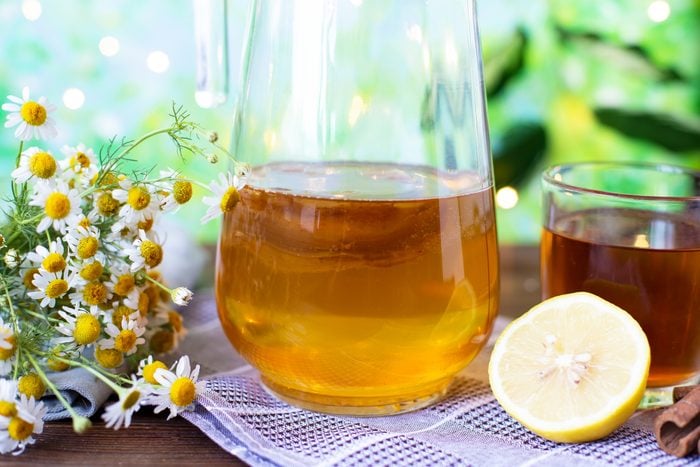
Kombucha
Some brands of gut-friendly kombucha may help stabilize your blood sugar, according to a 2022 clinical trial published in Foods.
But, says registered dietician Danielle McAvoy, RD, MSPH, it’s important to read the label when it comes to this superdrink. Some brands of kombucha contain loads of added sugar. McAvoy says it’s wise to look for a bottle with about six to eight grams, max.
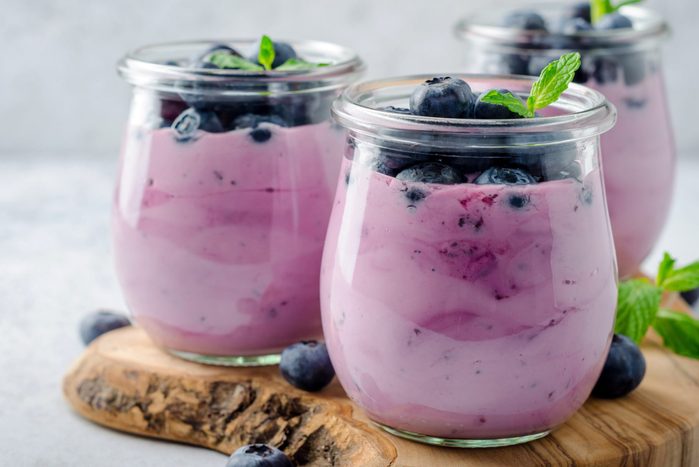
Flavored yogurt
A 2017 review of research published in The Journal of Nutrition says that yogurt contains some key nutrients to lower your risk of diabetes and stabilize your blood sugar. Still, you want to avoid artificial flavorings, added sugar, and packaged toppings, says Megen Erwine RDN, LDN at LetsGetChecked.
One pairing in particular to avoid? Flavored yogurt topped with granola. “That combo can have 40 grams of added sugar, [which equates to] 10 teaspoons of sugar,” Erwine explains.
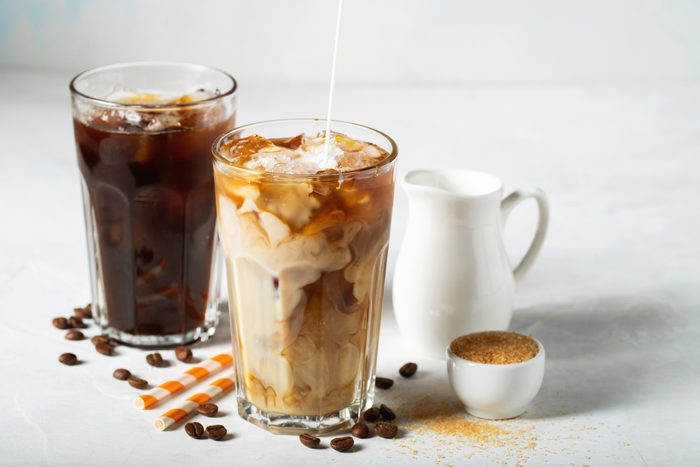
Coffee drinks
Research is mixed when it comes to coffee’s potential impact on your blood sugar, according to a review of studies published in the Journal of Traditional and Complementary Medicine. But one thing’s for sure—the extra sugar in your specialty coffee drinks is an express route to a blood sugar crash. “Many people are shocked by the amount of added sugar in their coffee drinks,” Erwine says. “For example, a 16-ounce grande coffee shop latte can have 35 grams of added sugar.” That’s nearly nine teaspoons.
Live better—keep reading:
- The 5 Best Hormone-Safe Sunscreens, Recommended by Doctors
- Rob Lowe Gets Candid about Fatherhood, Fitness, and the Diet That’s Been a ‘Very Good Fit’
- Dermatology Pros Just Listed Their 6 Favorite Vitamin C Serums
- I Tried Amazon’s Top-Selling Water Flosser—Here Are My Honest Thoughts
- This Hobby Made Me the Fittest (and Happiest) I’ve Ever Been: I Tried It
